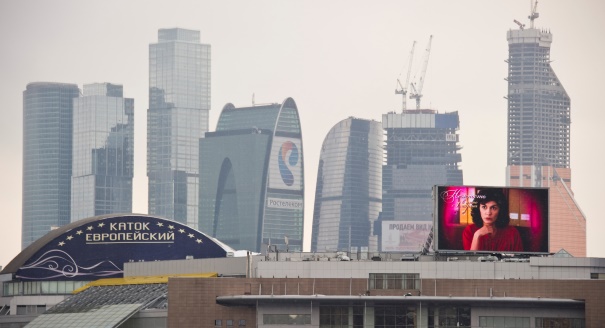The speech addressed Iran but said little about Ukraine, China, Gaza, or other global sources of tension.
Aaron David Miller
{
"authors": [
"Dmitri Trenin"
],
"type": "legacyinthemedia",
"centerAffiliationAll": "",
"centers": [
"Carnegie Endowment for International Peace",
"Carnegie Russia Eurasia Center"
],
"collections": [],
"englishNewsletterAll": "",
"nonEnglishNewsletterAll": "",
"primaryCenter": "Carnegie Russia Eurasia Center",
"programAffiliation": "",
"programs": [],
"projects": [],
"regions": [
"Russia",
"Eastern Europe",
"Ukraine"
],
"topics": [
"Economy",
"Foreign Policy"
]
}
Source: Getty
The West’s sanctions will be damaging to Russia and its people. However, standing up to Western pressure is likely to become the main feature of a newborn Russian patriotism and the central element of national consolidation.
Source: Foreign Policy
The Moscow stock exchange seemed to breathe a collective sigh of relief this week -- or perhaps shrug its shoulders -- upon hearing the news on Monday about the U.S. and EU sanctions against Russian officials. In fact, it recovered slightly after the sharp fall last week; the ruble, still in a much-weakened position, has regained a bit of ground against both the dollar and the euro, too. Obviously, investors had been expecting much harsher sanctions, and were momentarily relieved. The Russian individuals targeted in the Western sanctions have been mostly dismissive; some, like Vice Premier Dmitry Rogozin, even sarcastic. Only one of them is even known to own property in Europe, and it is in Switzerland, a non-E.U. country.
Many in Russia, however -- especially the business community -- fear that the sanctions imposed so far are only the first step in the escalation ladder. Like in the days of the first Cold War, there will be other rungs to climb in a crisis. Only this time, this escalation will be mostly political and economic, not nuclear -- a vital distinction. But with no compromise on Crimea or Ukraine in sight, and more competition likely, the escalation that has just started will probably continue for some time. And what we're left with as the "new normal" will be Moscow's semi-isolation from the West -- a degree of exile which Russia has never experienced since the break-up of the Soviet Union.
Vladimir Putin remains defiant, but he is not laughing.In the political sphere, Russia faces the prospect of exclusion from the Western-dominated clubs it joined or has long sought to join. The process of Russia's accession to the Organization for Economic Cooperation and Development (OECD), the global economic elite, has been suspended. The G8 will probably rest in peace, while the full-blown G7 will be revived. Ironically, Putin, the decider-in-chief on all issues related to Crimea and Ukraine, has not been barred from traveling in the United States or Europe. But Western leaders' summits with the Russian president will now become rare and frosty events.
The Russian-German inter-governmental consultations scheduled for April are likely to be canceled. France has already postponed the "2+2" foreign and defense ministers' meeting scheduled for later this month in Moscow. Even if Russia is not excluded from the Council of Europe, it will face strong and permanent criticism there, which might make Moscow consider whether its membership is worth the dues it pays. There is no way to kick Russia out of the U.N. Security Council or the Organization for Security and Cooperation in Europe, but exchanges in both bodies will become more polemical than productive.
Since one of the aims of Western sanctions is to drive wedges between Putin and his political associates and bureaucratic supporters, the list of persons barred from entering the United States and the EU is likely to be expanded. Already, the EU has stopped discussing visa liberalization with Moscow, which would have allowed Russian officials to travel in Europe without a visa, and would have made it easier for students and business people to make such trips. More is in store.
Those Russians who have bought property in places such as Spain may find it more difficult to come and visit their second homes. Wealthy Muscovites who have established a base for themselves and their families in London may suddenly see their position as less secure if the British government decides to put pressure on them. Eventually, the heads of Rosneft and Gazprom, both close to Putin, as well as the Kremlin oligarchs, may be added to the unwanted aliens list. Of course, this will not stop their companies' business operations in the West immediately, but it will come very close to serious economic sanctions.
The biggest issue in the ratcheting up of Western sanctions, however, is not how much they will hurt Russia, but how much they will hurt Western investors, companies, and workers. The blowback will be real and there will be some pain, but, eventually, probably not bad enough to prevent U.S. and EU leaders from imposing harsher financial and economic measures. The "Belarusian" model of sanctioning individuals close to the country's leadership will thus be followed by the "Iranian" model of cutting important banking, technological, industrial, and energy ties. From that level, there will be only one rung to Russia's full economic isolation in the West. That can't happen until the EU finds a way, however costly, to compensate for a significant reduction of energy imports from Russia. This may come in the form of U.S. liquid natural gas supplies, a resumption of Iranian deliveries, or domestically produced shale gas. With the commensurate slump in EU exports to Russia, trade will drop to a fraction of the $400-plus billion per year it is today.
There is no question that Western sanctions will be damaging to Russia and its people. Not being able to travel to Europe on vacation is one thing; not being able to buy the right kind of medicine is another. Of course, a country like Russia is self-sufficient to a significant degree, and it will not be completely isolated in the wider world. Faced with a "Great Wall of Europe" in the West, Russia will need to turn more to China, which will never join Western sanctions. But there will only be so much that the Russians can get from the Chinese. Beijing may provide Russia with some cash that will be difficult to generate in Western money markets, but it cannot replace Western technology and commercial investment.
Thus, Russia will be forced to breach the West's sanctions in all conceivable ways. Moscow will seek to circumvent Western sanctions by going through third parties, and using all possible loopholes, as Iran has been doing for a long time. Putin can bluster about direct confrontation, but the reality is that he respond to the West's measures asymmetrically, e.g. by moving against the West's supposed "fifth column" within Russia.
The central question, however, is what Western sanctions against Russia can ultimately achieve.
As both Belarus and Iran suggest, even the toughest sanctions will not be enough to provoke a regime change from the inside. The Europeans will be loath to apply additional sanctions, but they are likely to face pressure to do so from the United States, and will eventually follow the leader. NATO, finally, will rediscover its one and only true mission. But these actions will only serve to whip up Russian nationalism and defiance of the West. The Russian elite will not rebel, but they will be cleansed and disciplined as Putin sees fit. A few will leave, but most will stay. But in so doing, it will only strengthen Putin's rule.
Standing up to Western pressure will become the main feature of a newborn Russian patriotism and the central element of national consolidation. This pressure will make Moscow use all of its available resources, but it will also expose all the flaws of its social, economic, and political systems. Then, as they say, if the patient does not die, it will become stronger. The stakes cannot be higher.
Carnegie does not take institutional positions on public policy issues; the views represented herein are those of the author(s) and do not necessarily reflect the views of Carnegie, its staff, or its trustees.
The speech addressed Iran but said little about Ukraine, China, Gaza, or other global sources of tension.

Aaron David Miller
The pace of change in the global economy suggests that the IMF and World Bank could be ambitious as they review their debt sustainability framework.
C. Randall Henning
As discussions about settlement and elections move from speculation to preparation, Kyiv will have to manage not only the battlefield, but also the terms of political transition. The thaw will not resolve underlying tensions; it will only expose them more clearly.

Balázs Jarábik
Despite considerable challenges, the CPTPP countries and the EU recognize the need for collective action.

Barbara Weisel
France has stopped clinging to notions of being a great power and is embracing the middle power moment. But Emmanuel Macron has his work cut out if he is to secure his country’s global standing before his term in office ends.

Rym Momtaz